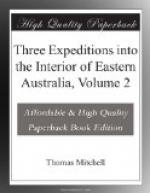HIGH REEDS ON THE RIVERBANK.
I saw the first of these heaps when near the end of the last day’s journey along the Lachlan, where this river partook of the reedy character of the Murrumbidgee. I understood that the balyan or bulrush-root which is the chief food of the natives there is prepared in those kilns when a family or tribe are together. I ascertained the name of the place to be Weyeba; its latitude is 34 degrees 21 minutes 34 seconds South; longitude 143 degrees 56 minutes 27 seconds East.
May 16.
We commenced our journey down the Murrumbidgee. Our route passed occasionally through reeds as we cut off the bends of the river; but they formed no serious impediment although they stood so high that we occasionally experienced some difficulty in following each other through them. Having found, after surveying the river a few miles down, that the general course was about south-west, as I had also found it to be above our camp, I followed that direction as a general line of route, leaving the river at length at some distance to the left. The country looked well, lofty yarra trees and luxuriant grass giving it the appearance of fine forest land; but most of these trees bore marks of inundation, and the water appeared to have reached several feet up their trunks. At length I came on a native path conducting westward; but as it led to rising ground with Atriplex halimoides, etc., I bent our course to the south and reached the river at sunset.
LAKE WEROMBA.
Burnett and Piper followed the native path until they came to the bed of a fine lake about half a mile across, and they met some natives who told them that the name of it was Weromba. Mr. Stapylton also discovered a small lake of the same sort near our route and south of the other. Both sheets of water, like that of Waljeers, were surrounded by a ridge of rising ground consisting of the red earth of the dry plains, and it was covered with the salsolaceous shrubs peculiar to them. These lakes seem to be supplied only from the highest floods of the river, and to constitute a remarkable and peculiar feature in the character of the surface. I had been informed of a very large one of the same kind named Quawingame near the left bank of the Lachlan, and not far from its junction with the Murrumbidgee; but the singular turn of the first-mentioned river prevented me from seeing it.
NATIVE ENCAMPMENT.
As we drew near the river I perceived the huts of a tribe with a fire smoking before each. I immediately sent back for the gins, but before they could come up the natives whom we saw there noticed us and immediately disappeared among the reeds, shrieking as if they had been mad. Our females soon after approached their huts and called on them to return, but in vain.
RIVERBANKS OF DIFFICULT ACCESS. BEST HORSE DROWNED.




